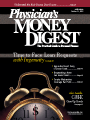The Master Plan for Trust and Respect
Our physician-readers might notknow it, but this year has beena tough one for medical publishers(and for publishing ingeneral). The combination of a sluggisheconomy and many businesses adopting a"wait and see" attitude has made for challengingtimes in the health care business.
Then again, few know about financialstruggles better than today's doctors.According to the American MedicalGroup Association, the averageannual compensation increase for a USprimary care physician last year wasabout –1%. That's right—doctors arelosing money at their work.
Feeling the Love
Physician's Money Digest
Still, it was with real enthusiasm thatthe staff of attended the annual meeting of theAmerican Academy of Family Physiciansheld in New Orleans in October (about70,000 FPs nationwide are readers). Thefabulously positive comments we heardfrom hundreds of doctors filled us withpride and recharged our engines. Here arejust a few of the supportive comments wereceived from our loyal fans:
- "You produce the best magazine in the world."
- "Out of all the magazines I receive—and that's quite a few—this is myabsolute favorite."
- "It's the only magazine that I read."
- "I save them when I get them and my wife yells at me to read them. It's agreat magazine."
- "I just started in practice. No one taught me about business or how to managemoney. Your magazine really helps."
- "I always read it cover-to-cover."
- "I read every issue religiously."
- "Every time it comes, I circle all of the information I use and even share it with my family."
- "I look forward to every issue. It's so helpful."
- "This is the magazine I put by my bedside the minute it comes in."
The foundation of any satisfyingencounter or relationship is based onmutual respect, and I maintain that thismagazine and its readers have that kindof connection. This synergy is based on3 core principles:
1) The Need
Contrary to the usual media reports,most doctors don't experience the "mansion-living, Mercedes-driving" life. Mostearn a good income, but that income is, atbest, stagnant. And too many are unpreparedto deal with the repercussions.
Taking an active role in the financialplanning process doesn't mean you haveto become an expert. Physicians need tobe experts about their own financial situation,objectives, feelings, and attitudes.Awareness of your own personal financialsituation is the key to success.
It's a fact, physicians are facing drasticchanges in their personal and professionaleconomic lives (ie, managed care,falling salaries, malpractice insurance andjudgment increases, and mounting debts).
It's tough, but true, medicine—manydoctors are clinically literate but financiallyilliterate. During their 7+ years ofmedical education (ie, medical school,internship, and residency), physicians receivelittle or no personal financial educationor training. And once a doctor isminted, a hectic professional life makesit very difficult to manage the excess offinancial information. Clearly, there's aneed for a fast-paced, practical, personalmoney resource.
2) The Delivery
Physician's Money Digest
is the onlypersonal finance magazine written exclusivelyfor busy doctors. Presented in areader-friendly and practical format, themagazine helps doctors to improvemoney management skills, build financialliteracy, protect net worth, and avoidcommon financial mistakes.
With a plethora of financial publications,Web sites, and investment productson the market, it's impossible for a busydoctor to do all of the necessary research.Our editors do the legwork for you, siftingthrough and reporting on the mostimportant information on all aspects ofpersonal finance. The brief, digest-style,"how-to" editorial format is our mantra.
A keen combination of education andentertainment has shaped an appealingand desirable publication.
3) The Results
Many physicians have admitted to usthat they are very concerned about theirfinancial future. Many more have saidthey are taking steps to correct their problems—thus our amazing popularity.
Over the past 9 years, our publicationhas realized an incredible upwardtrend in readership support. We made acommitment to deliver top-quality personalfinance and investment information,and readers have responded withtremendous encouragement. This is nosmall feat—the average doctor receivesmore than 60 magazines a month.
Independent readership scores revealus to be #1 in cover-to-cover readershipfor 6 consecutive years.* It'splausible to reason that deep readingequals deep trust.
As we enter our 10th year, our staffremains committed to the cause of advocacyfor physicians. Thanks, doctors.
*PERQ/HCI; Focus, 6/98, 6/99, 6/00, 6/01, 6/02,6/03; Table 102A (Multispecialty journals: GP, FP,IM, and DO-PC office-based)
